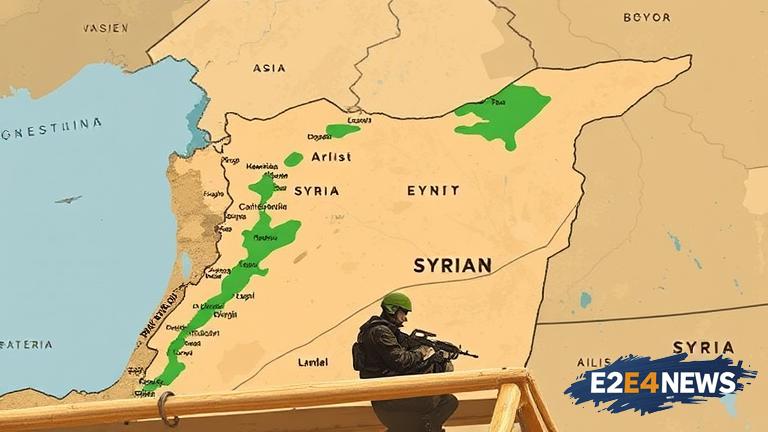The Israeli military has announced that it will remain in Syrian territory, despite international calls for withdrawal. This move has significant implications for the region, with many countries expressing concern over the ongoing occupation. The Syrian government has long maintained that the Israeli presence is a violation of its sovereignty, and has called for the immediate withdrawal of all Israeli forces. The international community has also weighed in, with the United Nations and other organizations urging Israel to respect Syrian territorial integrity. However, Israel has shown no signs of leaving, citing security concerns and the need to protect its citizens from potential threats. The occupation has been in place for decades, with Israel first entering Syrian territory in 1967. Since then, the country has maintained a significant military presence, including the construction of settlements and infrastructure. The situation has led to numerous conflicts and skirmishes over the years, with both sides suffering losses. The latest development has sparked a new wave of tensions, with many fearing that the situation could escalate into full-blown war. The Syrian government has vowed to take all necessary measures to defend its territory, while Israel has stated that it will continue to take steps to ensure its security. The international community is watching the situation closely, with many calling for a peaceful resolution to the conflict. The United States, a key ally of Israel, has urged restraint, while other countries such as Russia and Iran have expressed support for Syria. The occupation has also had a significant impact on the local population, with many Syrians forced to flee their homes or live under Israeli military rule. The situation has been further complicated by the presence of other armed groups in the region, including militant organizations such as Hezbollah. The Israeli military has stated that it will continue to operate in the area, despite the risks, and has called on all parties to respect its sovereignty. The Syrian government has rejected this call, stating that Israel has no right to be in the territory. The conflict has significant implications for the wider region, with many countries fearing that it could spark a broader conflict. The international community is urging all parties to engage in diplomatic efforts to resolve the situation peacefully. However, with both sides dug in and refusing to back down, a peaceful resolution seems unlikely. The situation remains volatile, with the potential for further escalation always present. The Israeli military’s decision to remain in Syrian territory has sparked widespread condemnation, with many calling for international action to be taken. The United Nations has stated that it will continue to monitor the situation closely, and has called on all parties to respect international law. The conflict has also had a significant impact on the regional economy, with trade and tourism affected by the ongoing tensions. The situation is complex and multifaceted, with many different parties and interests involved. A peaceful resolution will require careful diplomacy and a willingness to compromise from all sides. The international community must continue to pressure Israel to respect Syrian sovereignty and withdraw its forces. The Syrian government must also be willing to engage in diplomatic efforts and work towards a peaceful resolution. The situation is a reminder of the ongoing challenges and complexities of the Middle East, and the need for careful and nuanced diplomacy to resolve conflicts peacefully.
